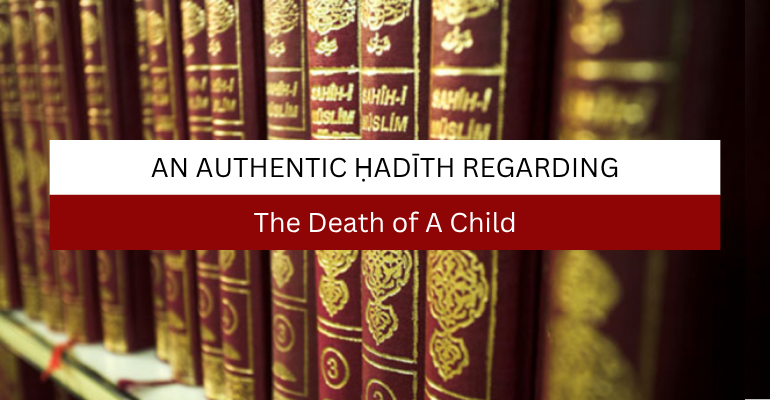Abu Ḥassān said to Abu Hurayrah: “Two of my sons have died. Can you tell me something from the Messenger of Allah ﷺ that will comfort our hearts regarding our deceased?”
He replied: “Yes. Their little ones are the little roaming ones of Paradise. One of them will meet his father — or he said both his parents — and he will grab hold of his garment – or his hand – just as I am holding the edge of your garment now, and he will not let go until Allah admits both him and his parent into Paradise.”
Narrator(s): Abu Hurayrah.
Reference: Ṣaḥīḥ Muslim.
Commentary:
- Death has been decreed by Allāh before a person even enters this world, and he decrees according to his divine wisdom. In death, there is no sequence; a healthy person may die before an ill person, the poor before the rich, the young before the old, and the child before the parent.
- A pain which nobody can imagine – except for the one afflicted by it – is the pain of a mother and father due to the death of their child[ren]. For this reason, their children will intercede for them on the Day of Resurrection.
- The Prophet ﷺ gave glad tidings of Paradise for a child who dies young, that the child will roam around Paradise as “da’āis” (little ones).
- The death of a child is a test for any parent, and people are tested in different ways, just as they are blessed in different ways. A parent who suffers this test should always remind themselves of the same test which the Prophet faced; he had 7 children; his 3 sons died in their infancy, and from his 4 daughters, he buried 3 who died during his own lifetime.
- This ḥadīth brings relief and comfort to a Muslim, who believes in the Final Day, and is patient over the decree of Allāh, certain in his divine wisdom and decree, that they will see their children; they will see their children in Paradise; and their children will hold on to their clothes or hands, pulling them into Paradise.
- A person should remain patient and not question the decree of Allāh. It is impermissible for a woman to wail, beat themselves or tear their clothes; or for a person to lose hope.
Related Āyāt:
- {And We will surely test you with something of fear and hunger and a loss of wealth and lives and fruits, but give good tidings to the patient. Who, when a calamity afflicts them, say, “Indeed we belong to Allāh, and indeed to him we will return.”. Those are the ones upon whom are blessings from their Lord and mercy. And it is those who are the [rightly] guided} [02:155-157]
Related narrations:
- Anas ibn Mālik narrated that when the Prophet’s baby son Ibrāhīm was ill, “The Prophet ﷺ took hold of Ibrāhīm, kissed him, and smelled him. Then, we (Anas and some Companions) entered as Ibrāhīm was breathing his last breaths. It made the eyes of the Prophet shed tears. ‘AbdurRaḥmān ibn Awf said, “Even you, O Messenger of Allāh?” The Prophet said, “O Ibn ‘Awf, this is mercy.” Then, the Prophet wept some more, saying, “Verily, the eyes shed tears and the heart is grieved, yet we will not say anything but what is pleasing to our Lord. We are saddened by your departure, O Ibrāhīm.” [Al-Bukhārī & Muslim]
- “He is not one of us who strikes the cheeks, tears the clothes, and laments with the call of the days of ignorance (Jāhiliyyah).” [Al-Bukhārī & Muslim]
قال أبو الحسان لأبي هريرة: “إنَّه قدْ مَاتَ لِيَ ابْنَانِ، فَهلْ سَمِعْتَ مِن رَسُولِ اللهِ ﷺ شيئًا تُطَيِّبُ به أَنْفُسَنَا عن مَوْتَانَا.”
قال: “نَعَمْ، صِغَارُهُمْ دَعَامِيصُ الجَنَّةِ، يَتَلَقَّى أَحَدُهُمْ أَبَاهُ – أَوْ قالَ: أَبَوَيْهِ – فَيَأْخُذُ بثَوْبِهِ – أَوْ قالَ بيَدِهِ – كما آخُذُ أَنَا بصَنِفَةِ ثَوْبِكَ هذا، فلا يَنْتَهِي حتَّى يُدْخِلَهُ اللَّهُ وَأَبَاهُ الجَنَّةَ.”
[صحيح مسلم]

